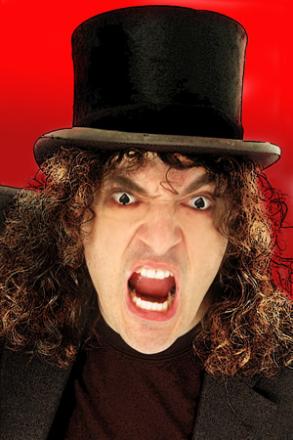
A brilliant interview with Jerry Sadowitz appeared on the British Comedy Guide website last night. Well, brilliant if you are one of the many broadminded people who have read it, maybe not so brilliant if you are Jerry Sadowitz. Though with the spleen-venting stand-up you never know what is going on under that old top hat. The tousle-haired curmudgeon seems to have taken issue with the emailed questions from the very start, dismissing a perfectly reasonable second question as "boring" before building up a head of steam and concluding by replying that the final question was so stupid that "when I meet you, I propose to write it down on cardboard and nail it to your face."
This is all fairly par for the course for Sadowitz though. I've heard tell of him hating his pictures, refusing to do interviews then demanding that interviews on the web that he has done get taken down (I wonder how long the British Comedy Guide one will last). And, naturally, he invariably does not want the press to review his shows, much to the chagrin of his long-suffering promoters who want to sell tickets. In the past he has telephoned me personally to request that I don't review his gig. He was actually very polite and nice about it and didn't once threaten to nail anything to any part of my anatomy.
Sadowitz is at the extreme end of comedians when it comes to dealing with the press (and actually at the extreme end of human beings generally), but he is not the only comedian who has difficulties with the way he is covered. Oh no. I recently had a problem with Daniel Kitson who seemed desperate not to have anything written about him, however glowing it might be. Both appear to hate most of the press coverage they get. Sadowitz submitted to the British Comedy Guide interview to publicise his forthcoming national tour, while Kitson does not want to publicise his gigs too widely in case people who "don't get him" – my phrase, not his – start tagging along.
Both of these cases highlight a more general problem with comedians and the press. It is, quite simply, hard to talk about the art of comedy to the satisfaction of both comedian and hack. When journalists pitch up to do their jobs they ask perfectly understandable questions, but even if the interviewee had not heard the question a thousand times they would still hate it. Take, for example, "where do you get your ideas from?"
OK, it is pretty bald, put like that, but sometimes it can elicit an illuminating response. Or a funny one, like "out of the bins round the back" or "from an old lady who goes door-to-door selling them." Or we might even get an insight into the creative mind of a clown. Is it a vivid imagination that can create humour out of nothing, or do they need an event to trigger off a comedic thought.
Then there is the problem that editors expect an interview with a comedian to be funny. But why? They don't expect an interview with a poet to rhyme. They don't expect a musician to break into song mid-chat. But comedians are expected to be "on" and some of them just want to be "off" when they not performing.
The trouble is that interviews are a performance too. An hour in a room with someone you have never met – but know all about via wikipedia – is never going to result in a natural conversation. And an interview is part of a contract – you say something interesting and in return we will help you sell whatever you are currently selling. The best comedians know how to play the game. It is nice to shake things up too though and funnily I think the Sadowitz interview is so unique it will sell tour tickets. Though I'm not sure what Sadowitz virgins will make of him in the flesh.
Anyway, the British Comedy Guide has my sympathies. We've all been there. A long time ago I did an interview on the phone which seemed to go perfectly well, but I had to end it abruptly to answer the front door. When I returned I realised I'd left the tape running and heard the interviewee say, before putting the phone down at their end, something on the lines of "what a ridiculous bunch of questions." So even when you've done a perfectly good interview don't rest on your laurels. Your smiling interviewee is probably preparing the hammer and nails as soon as you are out of the room.



